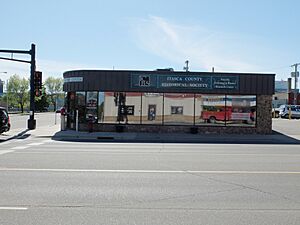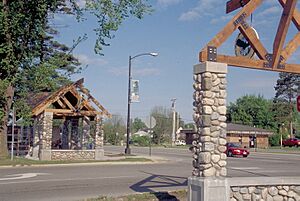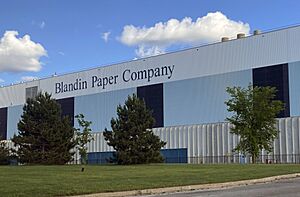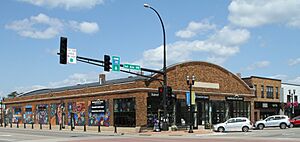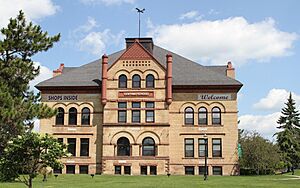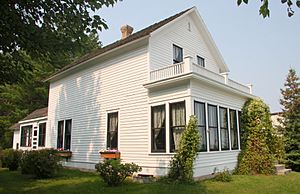Grand Rapids, Minnesota facts for kids
Quick facts for kids
Grand Rapids, Minnesota
|
|
|---|---|
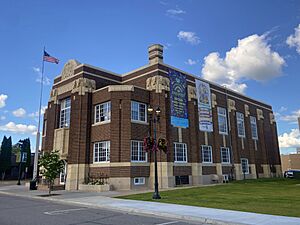
City Hall
|
|
| Motto(s):
"It's In Minnesota's Nature"
|
|
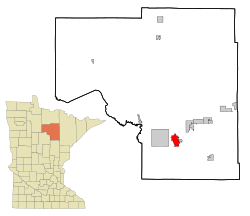
Location of Grand Rapids
in Itasca County and Minnesota |
|
| Country | United States |
| State | Minnesota |
| County | Itasca |
| Settled | 1872 |
| Incorporated (village) | June 9, 1891 |
| Established (county seat) | November 8, 1892 |
| Incorporated (city) | 1957 |
| Government | |
| • Type | Mayor – Council |
| Area | |
| • Total | 24.46 sq mi (63.36 km2) |
| • Land | 22.57 sq mi (58.46 km2) |
| • Water | 1.89 sq mi (4.90 km2) |
| Elevation | 1,289 ft (393 m) |
| Population
(2020)
|
|
| • Total | 11,126 |
| • Estimate
(2021)
|
11,220 |
| • Density | 492.91/sq mi (190.32/km2) |
| Time zone | UTC-6 (Central) |
| • Summer (DST) | UTC-5 (CDT) |
| ZIP code |
55744
|
| Area code(s) | 218 |
| FIPS code | 27-25118 |
| GNIS feature ID | 0656428 |
Grand Rapids is a city in Itasca County, Minnesota, United States. It is the main city, or county seat, of Itasca County. In 2020, about 11,126 people lived there.
The city gets its name from the 3.5-mile (5.6 km) long rapids in the Mississippi River. These rapids were the farthest point steamboats could travel up the river in the late 1800s. Today, a dam built by UPM Paper Company covers the rapids.
Contents
History of Grand Rapids
Grand Rapids started as a town for logging. The Mississippi River was perfect for floating logs to other towns. The Blandin Paper Mill opened in 1902.
The Forest History Center in Grand Rapids is a special place. It's a living history museum that shows what life was like in a logging camp around 1890. People dressed in old clothes guide visitors and teach them about the history of logging and how it still matters today. The center also has nature trails and a museum.
Old Central School is in downtown Grand Rapids. It was built in 1895 in a style called Richardsonian Romanesque. This three-story building was an elementary school from 1895 to 1972. In 1984, the community helped restore it. Now, it has shops and businesses and is listed on the National Register of Historic Places.
In 1991, a pipeline near the city had an oil spill. This was a large spill for an inland area, affecting the Prairie River.
Geography and Climate
Grand Rapids covers about 24.44 square miles (63.30 km2) of land and water. Most of this area, about 22.56 square miles (58.43 km2), is land.
Major Highways in Grand Rapids
Grand Rapids is where two important U.S. Highways meet: Highway 2 and Highway 169.
 U.S. Highway 2 goes west to Bemidji and east to Duluth.
U.S. Highway 2 goes west to Bemidji and east to Duluth. U.S. Highway 169 goes south towards Minneapolis. North, it goes through towns like Hibbing on the Mesabi Range.
U.S. Highway 169 goes south towards Minneapolis. North, it goes through towns like Hibbing on the Mesabi Range. Minnesota State Highway 38 starts here. It's known as the Edge of the Wilderness Scenic Byway and is a special road for sightseeing.
Minnesota State Highway 38 starts here. It's known as the Edge of the Wilderness Scenic Byway and is a special road for sightseeing.
Grand Rapids Climate
Grand Rapids has a Humid continental climate. This means it has warm summers and long, cold winters. This weather is typical for its location near the Mesabi Iron Range.
Population Information
| Historical population | |||
|---|---|---|---|
| Census | Pop. | %± | |
| 1900 | 1,428 | — | |
| 1910 | 2,230 | 56.2% | |
| 1920 | 2,914 | 30.7% | |
| 1930 | 3,205 | 10.0% | |
| 1940 | 4,875 | 52.1% | |
| 1950 | 6,019 | 23.5% | |
| 1960 | 7,265 | 20.7% | |
| 1970 | 7,247 | −0.2% | |
| 1980 | 7,934 | 9.5% | |
| 1990 | 7,976 | 0.5% | |
| 2000 | 7,764 | −2.7% | |
| 2010 | 10,869 | 40.0% | |
| 2020 | 11,126 | 2.4% | |
| 2021 (est.) | 11,220 | 3.2% | |
| U.S. Decennial Census 2020 Census |
|||
Grand Rapids Population in 2010
In 2010, there were 10,869 people living in Grand Rapids. There were 4,615 households, which are groups of people living together.
About 26.6% of households had children under 18. Many households (41.1%) were married couples. About 42.9% of households were not families.
The average age in the city was 42 years old.
- 22.2% of people were under 18.
- 8.5% were between 18 and 24.
- 22.4% were between 25 and 44.
- 26% were between 45 and 64.
- 20.8% were 65 or older.
The population was 47.5% male and 52.5% female. Most residents (94.6%) were White. Other groups included Native American (1.9%) and African American (0.6%).
Religion
Grand Rapids has many churches. Some of them include:
- New Song Alliance Church
- Grand Rapids Alliance Church
- Grand Rapids Evangelical Free Church
- St. Luke's Evangelical Lutheran Church (WELS)
- St. Andrew's Lutheran Church and Zion Lutheran Churches (ELCA)
- The United Methodist Church of Grand Rapids
- St. Joseph's Roman Catholic Church
- Full Gospel Church
- River of Life Church (Apostolic, Pentecostal)
- Grace Bible Chapel (non-denominational)
Economy of Grand Rapids
For a long time, Grand Rapids' economy was based on cutting down trees (timber harvesting). Even today, the Blandin Paper Mill, owned by the Finnish company UPM, makes paper in the downtown area.
The Mesabi Range, also called "The Range," is an area known for iron mining. It starts near Grand Rapids. While Grand Rapids is part of this area, its economy has mostly focused on making paper and other wood products.
ASVI (All Season Vehicles Inc), now called Yanmar Compact Equipment North America, has been important to Grand Rapids since the mid-1990s. They make compact track loaders in their Grand Rapids factory.
Today, tourism is also a big part of the economy. The area has many resorts and four golf courses. There are over one million acres of public and industrial forests, which are great for hunting. More than 1,000 lakes offer excellent fishing. Grand Rapids also serves as a central hub for about 46,000 people, including many who have summer homes on the nearby lakes.
Annual Tourism Events
Grand Rapids hosts several fun events each year that attract visitors:
- Home & Cabin Show - March
- White Oak Classic Dog Sled Race – March
- Children's Fair - April
- Bluegrass Music in the Pines Festival - June
- Itasca Pride - June
- Wizard of Oz Festival – June
- Timberman Triathlon - July
- Weekend On Wheels Northern Mn Swap Meet & Car Show – July
- Tall Timber Days – August
- Grand Slam of Golf Tournament – August
- Threshing & Antique Show - August
- Bargains are Great on 38 - September
- Mississippi River Festival - September
- National Ruffed Grouse Society Annual Hunt – October
- WinterGlo Festival - December
Education in Grand Rapids
The public schools are part of ISD 318. The schools within the city are West Elementary, East Elementary, Robert J. Elkington Middle School, and Grand Rapids High School. St. Joseph's Catholic School is a private school. Minnesota North College - Itasca also serves the community.
Media
Local Radio Stations
Grand Rapids has its own radio stations. You can also hear many stations from the wider Iron Range area.
- KOZY 1320 AM – Talk/Oldies music
- K201IX FM 88.1 – Plays Contemporary Christian music, like Duluth's KDNW
- KMFY 96.9 FM – Adult Contemporary music
- KAXE 91.7 FM – Public Radio (this was the first rural public radio station in the U.S.!)
- WDKE 96.1 FM – Country music
- K256CW FM 99.1 – Plays Christian talk and teaching, like Duluth's KDNI
- KBAJ 105.5 FM – Classic Rock music
Newspapers
- Grand Rapids Herald-Review – This newspaper comes out on Sundays and Wednesdays.
Television Stations
Most TV in Grand Rapids comes from stations in Duluth, Minnesota. Some cable users can also get stations from Bemidji and Minneapolis. There's also a local community TV station that covers local government and events.
- KAWE 9 – A PBS station from Bemidji.
- KRII 11 – An NBC station for Chisholm/Hibbing. It also shows KBJR-TV (NBC) and KDLH (CBS) from Duluth.
- KCCW 12 – A CBS station for Walker/Bemidji/Brainerd. It shows WCCO-TV (CBS) from Minneapolis.
- WIRT 13 – An ABC station for Hibbing. It shows WDIO (ABC) from Duluth.
- K29EB 29 – A translator for KQDS-TV (FOX) from Duluth.
- WRPT 31 – A PBS station for Hibbing. It shows WDSE (PBS) from Duluth.
Famous People from Grand Rapids
Many notable people have connections to Grand Rapids:
- Bill Baker, a member of the "Miracle on Ice" 1980 U.S. Olympic Hockey Team.
- Chilton C. Baker, who served in the Minnesota House of Representatives.
- Hugh Beaumont, an actor known for Leave it to Beaver.
- Jon Casey, a professional hockey player for the Minnesota North Stars.
- Judy Garland, a famous actress and singer, born in Grand Rapids on June 10, 1922.
- Alex Goligoski, a current professional hockey player for the Minnesota Wild.
- Lois Hall, an actress.
- Eric Enstrom - photographer of Grace, the state photograph of Minnesota.
- Trent Klatt, who played in the NHL.
- Robert N. Lemen, a member of the Minnesota House of Representatives.
- Don Lucia, a hockey coach at the University of Minnesota.
- Jeff Nielsen, a professional hockey player for the Minnesota Wild.
- Norman Ornstein, a political scientist.
- Jim Pehler, a Minnesota state legislator.
- Dick Pesonen, a professional football player.
- Janelle Pierzina, a cast member on the Big Brother TV show.
- Norman Rudolph Prahl, a Minnesota state legislator.
- Jon Rohloff, a professional hockey player for the Boston Bruins.
- Dusty Rychart, a basketball player for the Cairns Taipans.
- Granville Van Dusen, an actor.
- Adam Johnson, a professional hockey player for the Nottingham Panthers.
See also
 In Spanish: Grand Rapids (Minnesota) para niños
In Spanish: Grand Rapids (Minnesota) para niños


